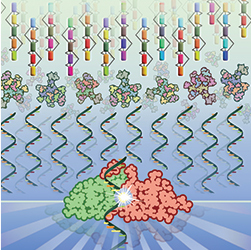Pervasive RNA-Binding Protein Dependencies Define Leukemic Stem Cells

Leukemic stem cell (LSC)–targeted therapies remain a significant unmet need in acute myeloid leukemia (AML). Vujovic, de Rooij et al. used an LSC-focused in vivo CRISPR screen to unveil widespread RNA-binding protein (RBP) dependencies in LSCs including top hit ELAVL1. Genetic and pharmacological inhibition of ELAVL1 significantly impaired leukemic propagation and LSC function while relatively sparing hematopoietic stem cells. Integrative multi-omics analyses revealed posttranscriptional enforcement of LSC-supportive mitochondrial metabolism underpinning ELAVL1 function. This study uncovers novel RBP dependencies unique to LSCs and demonstrates ELAVL1 to be an LSC-specific vulnerability with clinical relevance.
Genomic Evolution of Classic Hodgkin Lymphoma

In classic Hodgkin lymphoma (cHL), malignant cells—called Reed Sternberg (HRS) cells—make up only a minority of the tumor. Thus, cell purification is crucial to study cHL genome alterations. Guilino-Roth et al. presented a comprehensive landscape of mutations, copy number, and structural variants of sorted HRS cells and matched normal tissue in cHL obtained by whole-genome sequencing. Analysis of this dataset uncovered new cHL putative drivers. Further analysis reconstructs a plausible order in which distinct types of genomic lesions have been acquired, offering new insights into genetic timing and mechanisms of cHL oncogenesis. As B cells undergo characteristic RAG- and AID-mediated mutagenesis processes at specific developmental stages, reconstruction of oncogenic events is further superimposed onto B-cell ontogeny, suggesting for example that early structural variants are likely acquired at naïve B-cell stage, whereas large structural changes occur late.
METTL3 Regulated Splicing Factor Abundance Contributes to Aggressive CLL

RNA splicing dysregulation is a hallmark of chronic lymphocytic leukemia (CLL). Wu, Jin et al. determined the mechanism of splicing defects in spliceosome-unmutated CLL cases. Through transcriptomic and proteomic data analysis, the authors found that the RNA splicing pathway is posttranscriptionally regulated, and spliceosome complex protein expression is an independent risk factor in CLL. Moreover, the authors discovered that METTL3 regulates splicing factor expression via translational control of m6A-modified mRNA, contributes to RNA splicing dysregulation and disease progression, and serves as a therapeutic target in aggressive CLL, suggesting a novel regulatory axis in driving splicing dysregulation in CLL.


